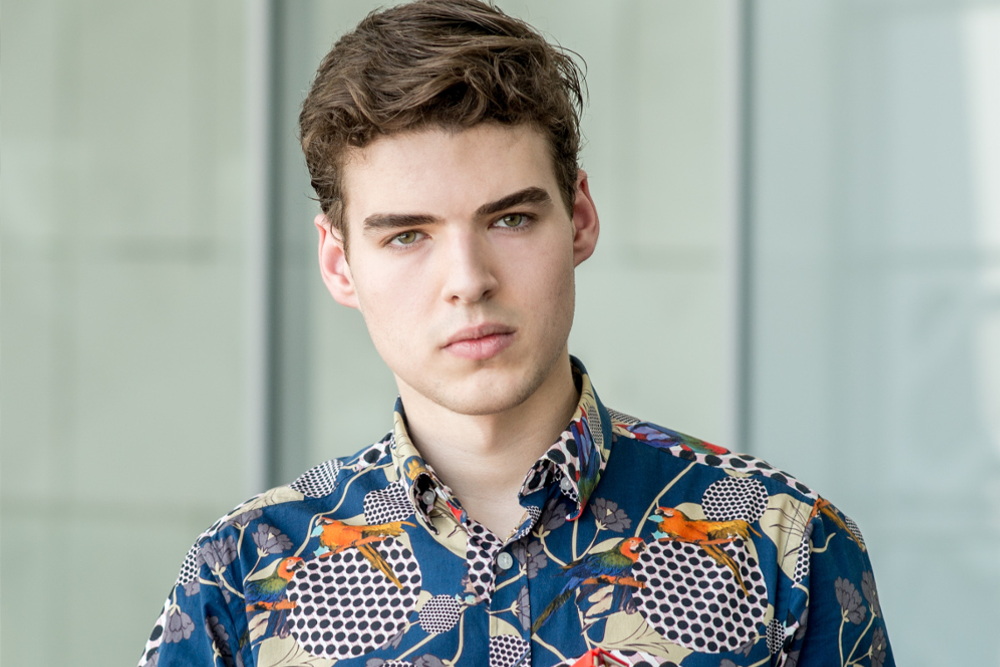The 22-year-old from Podlasie enchanted the world with his artificial eye. He has not completed his studies and has more inventions than the index entries [INN Poland]

for: INN Poland
Many of us have no idea about the everyday problems of the blind. How to pair socks after washing? How to recognize the number of the bus that has just arrived? Well aware of the difficulties faced by the blind every day, Piotr Psyllos, a 22-year-old student from Bialystok University of Technology, has decided to help the visually impaired and constructed a device called Matia. What is that? Matia is the Greek word for eyes.
” I have been working closely with the Audio-Description Foundation from Bialystok for the past two years. I am trying to learn about the problems of the blind from the inside”, Psyllos said in an interview with INN: Poland young inventor. “And because I specialize in issues of image processing and artificial intelligence, I decided to use this knowledge to help the visually impaired”, he added.
It all started with glove-supported communication. Nineteen-year-old Piotr had created a device that helped mute people communicate. He called it a talking glove. A special speech synthesizer converts gestures to sound. In this way, a person who can not speak, has a chance at normal voice communication. The young inventor's project got first prize at the Brussels World Fair of Innovation Research and New Technologies, "Brussels Innova 2013".
“The glove was too large and therefore inconvenient to use”, says Piotr Psyllos. “But it served as the basis for my next project”, he explains.
A year later, Piotr created Neutrognet, which he describes as virtual chalk. A signet placed on the finger allows you to write by making gestures in the air. The system recognizes letters and the Braille alphabet. In this way, people can write text messages without taking their phone out of their pocket. The signet itself does not display information, it only voices it. This allows the blind to use the multimedia features of their smartphones. In 2015, the project won the nationwide Student Construction competition, and received an additional award from the Plus Business Incubator.
“I have founded a student cooperative at my university. We want to produce 100 units of this device. The idea is to gain experience and improve the product”, says Psyllos. “I've tried to commercialize it, I have been to many meetings with investors, but so far nothing has come out of it. I was offered quite weak conditions. The contracts are written in such a language that without a lawyer it is impossible to move forward. And I don't want to suffer because of my ideas”, he added cautiously.
Neutrognet was another step toward the device Matia, which was what caught the attention of jurors from the Massachusetts Institute of Technology. The artificial eye Psyllos presented during the Polish Finals of Innovators Under 35 delighted the audience gathered there. The audience was not only impressed by the invention, but also by the self-confidence and stress-free attitude of the young inventor during his presentation.
Matia is a small box which a blind person can clip onto their belt. More than a dozen sensors collect information and continuously process it. A marine siren warns of obstacles, a female voice describes the people who find themselves in the eye of the camera. The device works via Bluetooth and connects to a smartphone. As emphasized by the designer, the phone can be tucked into a pocket and as a result, it is not vulnerable to breaking or being stolen.
“Mati, in Greek means ‘eye’. Matia means ‘eyes’”, explains Psyllos. His mother is Polish and his father is Greek. Piotr, sometimes called Petros, was born on the Aegean island of Chios, but lives with his parents in Bialystok. He is studying at the local University of Technology. The university enrolled him in a program that supports talented youth called Diamond Explorers (Odkrywcy Diamentów), which finances his projects and allows him to compete in international competitions. The university has also allowed him to pursue an individual course of study.
On his website, psyllos.pl, one of the major tabs is that of achievements. Among the most important are: Gold Medal: INPEX, Pittsburg, USA (2016), Golden Star Award, INPEX (2016), Gold Medal 115; World Exhibition on Innovation Concours Lépine in Paris (2016), Gold Medal and the Main Prize of the French Ministry of Social Affairs and Health (2016), and the already mentioned Gold Medal at the International Fair for Research and Innovation BRUSSELS-INNOVA in Brussels (2013).
“For now, everything I do, I do to gain experience, knowledge that will protect me from manipulation and making mistakes”, says the man who has a legacy larger than many dashing start-ups, and he is not going to stop anytime soon. “Now I'm working on a musical hits generator. I have created artificial intelligence, to which I will add one thousand of the best songs, as ranked by the magazine Rolling Stone. Based on this data, the algorithm will find the common characteristics among them. “Because music is math”, he adds.
The man who has delighted the world is privately quite modest. Although many rave about his inventions, he hasn't let success go to his head. He looks at his watch and says:
“You know what, I'm sorry, I have to go, I've got an English lesson”. Piotr Psyllos is very down-to-earth.
source: http://innpoland.pl/128025,22-latek-z-podlasia-zachwyca-swiat-sztucznym-okiem-nie-ukonczyl-studiow-a-ma-wiecej-wynalazkow-niz-wpisow-w-indeksie
